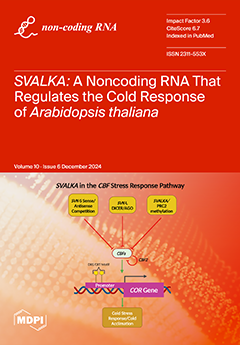Our recently created RNA-sequence-based microRNA (miRNA) expression signature in breast cancer clinical specimens revealed that some
miR-30 family members were significantly downregulated in cancer tissues. Based on TCGA database analyses, we observed that among the
miR-30 family members,
miR-30a-3p (the passenger strand derived
[...] Read more.
Our recently created RNA-sequence-based microRNA (miRNA) expression signature in breast cancer clinical specimens revealed that some
miR-30 family members were significantly downregulated in cancer tissues. Based on TCGA database analyses, we observed that among the
miR-30 family members,
miR-30a-3p (the passenger strand derived from pre-
miR-30a) was significantly downregulated in breast cancer (BC) clinical specimens, and its low expression predicted worse prognoses. Ectopic expression assays showed that
miR-30a-3p transfected cancer cells (MDA-MB-157 and MDA-MB-231) had their aggressive phenotypes significantly suppressed, e.g., their proliferation, migration, and invasion abilities. These data indicated that
miR-30a-3p acted as a tumor-suppressive miRNA in BC cells. Our subsequent search for
miR-30a-3p controlled molecular networks in BC cells yielded a total of 189 genes. Notably, among those 189 genes, cell-cycle-related genes (
ANLN,
MKI67,
CCNB1,
NCAPG,
ZWINT,
E2F7,
PDS5A,
RIF1,
BIRC5,
MAD2L1,
CACUL1,
KIF23,
UBE2S,
EML4,
SEPT10,
CLTC, and
PCNP) were enriched according to a GeneCodis 4 database analysis. Moreover, the overexpression of four genes (
ANLN,
CCNB1,
BIRC5, and
KIF23) significantly predicted worse prognoses for patients with BC according to TCGA analyses. Finally, our assays demonstrated that the overexpression of
ANLN had cancer-promoting functions in BC cells. The involvement of
miR-30a-3p (the passenger strand) in BC molecular pathogenesis is a new concept in cancer research, and the outcomes of our study strongly indicate the importance of analyzing passenger strands of miRNAs in BC cells.
Full article






